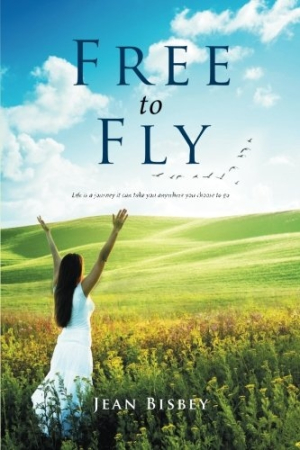Free to Fly
With its successful and balanced approach to human connection and spirituality, Free to Fly is compelling.
Free to Fly by Jean Bisbey is a thought-provoking exploration of the deep philosophical questions that all people face, as well as a commentary on the universality of an omnipresent God.
The novel opens with a chance encounter between world-renowned psychologist Fergus MacGregor and lounge musician Sarah Giles. Their chemistry is electric, and the two engage in a deep, meaningful conversation that covers a host of topics, from the nature of thought and creativity to the necessity of looking within oneself to figure out greater truths.
The rest of the text is split between perspectives, following both protagonists through their spiritual awakenings. For Fergus, forward movement can only be achieved by combating old defense mechanisms meant to keep others at bay. Sarah, in turn, has to reckon with her psychologically abusive husband and embrace her independent, joyful nature.
Philosophy is wonderfully explored in Free to Fly. Each character is imbued with a different perspective, allowing Bisbey to cover many topics in a short space. The primary idea that looking within is the key to greater understanding permeates the text, appearing in many conversations. This approach is not overbearing, as it is expertly introduced early and then developed throughout. Even Fergus, who initially introduces the concept to Sarah at their first meeting, does not truly understand the value of looking within until his beliefs are tested by an unhealthy relationship and a troubling patient.
Compelling and believable characters make for a dynamic read. At times, dialogue can be a bit stilted, but this is compensated for with a wealth of useful exposition that moves the story along. Changing perspectives from chapter to chapter keeps the narrative fresh, allowing differing viewpoints adequate space to be explored. Even secondary characters are given room to develop, creating a richness that speaks to the book’s overall message of spiritual universality.
Free to Fly is succinct, but manages to achieve everything it seeks to do. Chapter breaks come at moments that signal crucial events for their narrators, an approach that builds intrigue and also allows for a freedom of form—no topic is ever delved into too deeply at once. Chapter titles like “Everything Affects Everything” and “Loose Ends and Dangling Threads” speak to the issues that specific characters are facing, while also tying in with the book’s overall theme.
Featuring a successful and balanced approach to human connection and spirituality, Free to Fly offers up a compelling narrative with dynamic characters.
Reviewed by
Amanda Adams
Disclosure: This article is not an endorsement, but a review. The publisher of this book provided free copies of the book and paid a small fee to have their book reviewed by a professional reviewer. Foreword Reviews and Clarion Reviews make no guarantee that the publisher will receive a positive review. Foreword Magazine, Inc. is disclosing this in accordance with the Federal Trade Commission’s 16 CFR, Part 255.

